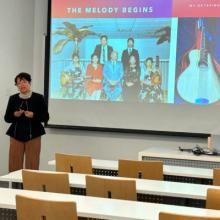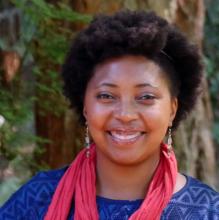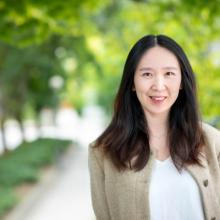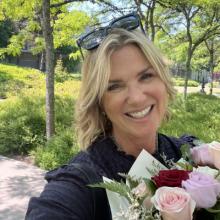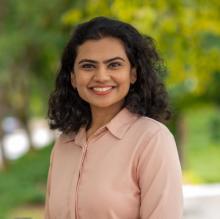The Public Scholars Initiative will give me the opportunity to reach a wider audience and connect with scholars across disciplines who could benefit from a holistic listening approach to support their decolonial journey and deepen their understanding of Indigenous perspectives.
Research Description
My doctoral research is grounded in a conceptual framework I call Relational Listening, shaped by the affordance of listening to and engaging with Indigenous-led podcasts as a form of social scholarship. I seek to establish a holistic approach to teaching and learning with Indigenous-led podcasts that will assist pre-service teachers in integrating Indigenous histories, perspectives, and ways of knowing into their practices as emerging educators. As a non-Indigenous researcher, this work will examine how best to support non-Indigenous pre-service teachers in their commitments to reconciliation, right listening relations, and decolonization. Podcasts as social scholarship (Singer, 2019) has been validated in the Faculty of Social Work, to disseminate research, mobilize knowledge, and keep practitioners and general audiences aware of ongoing and complex narratives from the past, present, and looking to the future. My research identifies a gap in the Faculty of Education, where podcasts have yet to be leveraged as social scholarship to equip pre-service teachers with ongoing development. This research seeks to demystify and provide clarity on the relevance of policy directives to inform praxis, practices, and programs that will assist the Faculty of Education, pre-service teachers, educators, interdisciplinary scholars, and public audiences with “living right relations” (Hare, 2023).
What does being a Public Scholar mean to you?
It is a great honor to be recognized as a Public Scholar, but it also comes with the responsibility to ensure my doctoral work aligns with Indigenous policy directives and priorities outlined in UNDRIP (2007), TRC’s 94 Calls to Action (2015), DAAP (2022), and UBC’s Indigenous Strategic Plan (2020). As an ethical Public Scholar committed to right listening relations, I recognize the relevance of my research to Indigenous communities as it prioritizes the action of non-Indigenous people to listen to Indigenous perspectives around societal and political changes, especially in pre-service teacher development. Being a Public Scholar means not only listening to diverse perspectives but also acting upon that understanding.
In what ways do you think the PhD experience can be re-imagined with the Public Scholars Initiative?
My doctoral research is only as valuable as the people who can access it. That’s why I believe the knowledge mobilization tools and interdisciplinary networking available through the Public Scholars Initiative (PSI) will expand my outreach and broaden my conceptual framework on Relational Listening. This framework aims to build intercultural understanding by emphasizing the importance of listening to Indigenous knowledge, stories, and lived experiences rooted in Indigenous oral traditions and epistemologies. The PSI will enable me to connect with scholars across various disciplines who can benefit from a framework for Relational Listening that guides their decolonial journeys and deepens their continuous understanding of Indigenous perspectives. My research develops Relational Listening through a holistic approach grounded in decolonial research methodology, particularly for non-Indigenous pre-service teachers who may not recognize the significance or relevance of Indigenous-led podcasts as social scholarship. This praxis must extend beyond the Faculty of Education to all sectors of society, making the PSI a valuable platform for interdisciplinary outreach.
How do you envision connecting your PhD work with broader career possibilities?
I never considered my doctoral research solely in terms of ambitious career possibilities or isolated from Indigenous priorities. My work, supported by my academic supervisor, Dr. Jan Hare (Anishinaabe), aims to privilege Indigenous-led podcasts as a form of social scholarship that supports pre-service teachers and constant professional development for educators. My relational accountability (Wilson, 2008) is central to this work; as a non-Indigenous graduate student and researcher, my positionality is always transparent. I hope to create new career opportunities that align with Indigenous policy directives while assisting pre-service teachers in their roles and responsibilities. I believe my nuances will bring a unique intercultural lens and open new pathways needed in academia and society.
Although my research focuses on Relational Listening for pre-service teachers and their professional development, I believe this conceptual framework can also benefit other disciplines by engaging with Indigenous-led podcasts to inform their praxis. I envision applying this framework to educate newcomers to Canada, as suggested in the Truth and Reconciliation Commission's 94 Calls to Action.
The TRC's Final Report emphasizes the need for best practices in teacher development that foster intercultural understanding, empathy, and mutual respect (TRC, 2015, Call to Action #63). We all have spheres of influence, and my ultimate hope is to leverage these spheres to create a significant public impact for the dignity of all human beings beginning with Relational Listening.
How does your research engage with the larger community and social partners?
As a non-Indigenous graduate student and emerging scholar, I prioritize transparency regarding the nuances of my identity and my positionality within my research. I am a second-generation Filipina Canadian (born in Canada to parents originally from the Philippines), a Catholic Christian, an educator, a wife, a mother, and a graduate student.
Former Canadian Senator, Judge, and Chair of the Truth and Reconciliation Commission of Canada, the Honourable Murray Sinclair, stated, “While education is what got us into this mess, education is also the tool that will get us out” (TRC, 2015). I believe my doctoral work will contribute to implementing policy directives from the Provincial Government of British Columbia, which aims to be the first province in Canada to act on the United Nations Declaration on the Rights of Indigenous Peoples. This commitment positions the University of British Columbia as a significant stakeholder. Given the nuances of my identity, I approach my research as a learner ready to listen to the needs of Indigenous peoples and communities, particularly the guidance of Indigenous mentors dedicated to their relational commitments.Relational accountability (Wilson, 2008) is vital when collaborating with Indigenous priorities at international, national, provincial, and institutional levels.
In gratitude and deep respect, I thank Dr. Mukwa Musayett Shelly Johnson (Saulteaux), Canada Research Chair in Indigenizing Higher Education, for inviting me to be part of the solution. Working on the graduate student-led project titled “Indigenous Podcast Series: Privileging Indigenous Oral Traditions Past, Present, and Future” (http://indigenouspodcast.trubox.ca/) taught me the importance of listening first to Indigenous peoples. I am also grateful to Dr. Gloria Ramirez from Thompson Rivers University for her assistance with my decolonial journey and autoethnographic research process. Through this challenging experience, I refined my understanding of reconciliation, to ensure meaningful relationships are guided by Indigenous principles of respect, responsibility, reciprocity, and an awareness of the significance and relevance of what was just shared.
I extend my heartfelt thanks to Dr. Jan Hare (Anishinaabe), Dean of the Faculty of Education at UBC and Canada Research Chair in Indigenous Pedagogy, for her ongoing mentorship and support as my academic supervisor. Thank you for allowing me an opportunity to be guided by your leadership. I am excited to contribute to educational milestones that promote intercultural understanding and set a pathway for Relational Listening that propel meaningful relationships with Indigenous Peoples.
Why did you decide to pursue a graduate degree?
As a mother of eight children, pursuing a PhD was never really on my radar. It is an ambitious path, but passion drives you to find ways to make it work. As a mother and educator, I believe we can do it all—just not all at once. This decision involved not only me but also my husband and our children, who range from 19 to 4 years old, along with the support of my parents and a strong supportive “village” around me. My motivation was clear: “If not me, then who? If not now, then when?”
On May 27, 2021, the Tk'emlúps te Secwépemc First Nation announced the discovery of 215 unmarked graves. At the time, I was enrolled in a Master’s program focused on Indigenous research, and this moment profoundly shifted my perspective. As a Catholic Christian, I realized the importance of listening more deeply to Indigenous narratives, even when they challenged me. This moment of reckoning pushed me to reflect on my responsibilities to the Truth and Reconciliation Commission’s 94 Calls to Action.
During my M.Ed. program, I conducted qualitative research through an autoethnography, asking, “How can I, as a second-generation Filipina Canadian, Catholic, educator, and mother, contribute to reconciliation?” Now, I prefer the term living right listening relations. Using my 14-string Octavina as a metaphor, I understood the importance of continuously 'fine-tuning' my understanding by listening to Indigenous scholars and knowledge keepers. This process ignited my desire to pursue a PhD, realizing that Indigenous-led podcasts hold immense potential as social scholarship needing to be unlocked. They offer ongoing insights into complex sociocultural, historical, and political narratives—critical knowledge for pre-service teacher education and thereafter.
I also looked to my ancestors for inspiration. My grandmother, the late Adoracion Macapagal, was a pioneer in the Manitoba Association of Filipino Teachers Incorporated (MAFTI). Her dedication to preserving Filipino language and culture in Canada taught me the importance of resisting assimilation while valuing one’s heritage. I aim to instill in my children the values of fighting against injustice, rejecting complacency about past wrongs, and striving to improve their communities and society. These values were shaped by my parents, Frank (Francisco Jr.) and Myrna Macapagal. Mabuhay - (which means Long Live in Tagalog!)
Why did you choose to come to British Columbia and study at UBC?
My mentor advised me to consider returning to UBC, my alma mater, to benefit from studying directly with Indigenous faculty. Having earned my B.A. and B.Ed. from UBC and my M.Ed. from TRU, returning felt like coming home. When I reached out to Dr. Jan Hare to explain my doctoral research goals and interests, she graciously offered to be my academic supervisor and mentor. This academic guidance will ensure my research is conducted with relational accountability, respect, responsibility, and reciprocity. Furthermore, British Columbia adopted the Declaration on the Rights of Indigenous Peoples Act (2019) making UBC one of the leading universities supporting international policy directives (UNDRIP), hence returning to my alma mater was the best option for me.

